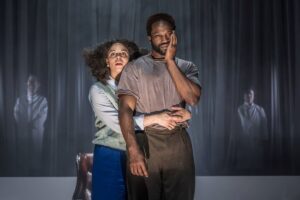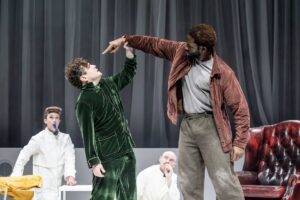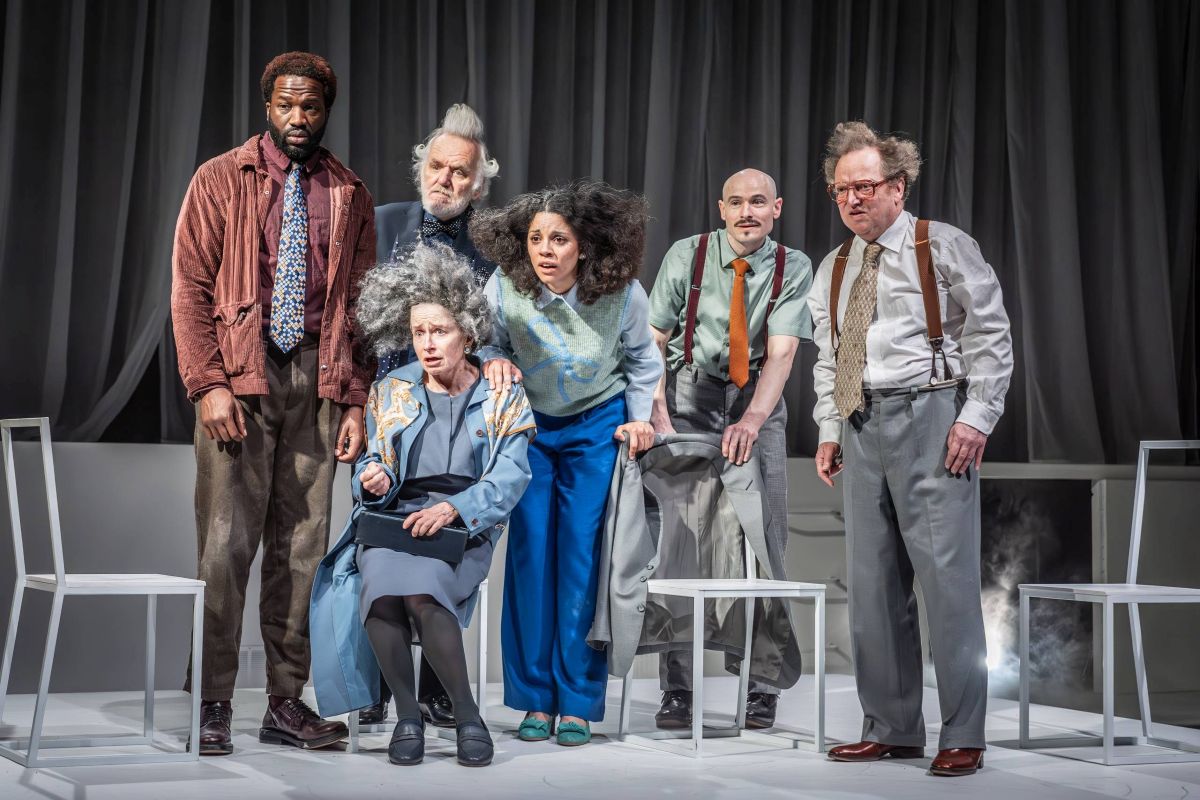Eugène Ionesco’s Rhinoceros navigates the line between absurdity and stark reality, probing the question: how far will a person go to conform? Directed by Omar Elerian at the Almeida Theatre, this production takes Ionesco’s surreal narrative and reinvents it, offering a constantly immersive experience that reinforces theatre’s constructed, absurd nature.
Set in an unnamed location where individuals gradually transform into rhinoceroses, the play follows Bérenger (Ṣọpẹ́ Dìrísù), who remains bewildered and increasingly isolated as his friends, neighbours, and colleagues succumb to the collective madness. While Elerian’s inventive direction adds vibrancy, the play’s deeper existential message sometimes becomes overshadowed by the spectacle.
A key feature of this production is the active involvement of the audience. Paul Hunter, as the narrator—a role created specifically for this staging—masterfully engages the audience, directing them to make certain hands movements, to blow into kazoos, handed out at the interval, to simulate a herd of rhinoceroses. This interactive element blurs the line between performer and spectator, reinforcing the central theme: how easily individuals slip into the herd mentality.
The production shines thanks to its talented ensemble cast. Sophie Steer, John Biddle, and Hayley Carmichael and Alan Williams, deliver performances with impeccable comic timing, fully embracing the absurdity of their roles. Steer, in particular, stands out with her commanding physicality and sharp comic timing, pulling the audience deeper into the play’s chaotic world. Anoushka Lucas, as Daisy, adds delightful eccentricity and lightness to the increasingly dark tone. Her whimsical love song in Italian is a breath of freedom in an otherwise stifling environment. Her eventual transformation into a rhinoceros is particularly poignant, underscoring the inevitability of conformity—even for love.

The standout performance, however, is Joshua McGuire as Jean, Bérenger’s best friend. McGuire brings infectious energy to his role, effortlessly blending comedy with the mounting frustration of a man caught up in the madness. His physical transformation into a rhinoceros is executed with remarkable clarity, and his ability to seamlessly shift from farce to genuine emotion anchors the play, grounding its absurdity in human reality.

Despite these strong performances, the production falters in its handling of Bérenger’s character, the heart of the existential struggle between individuality and social conformity. Dìrísù’s portrayal while effective in conveying frustration, doesn’t fully capture the character’s internal complexity. Bérenger’s passive nature often feels detached, and his final cry of resistance—repeated and prolonged—feels disconnected from the vibrant chaos that precedes it. By the time Bérenger’s defiance echoes through the theatre, the emotional weight of his struggle has been somewhat diluted by the comedic energy that dominated earlier scenes.
Ultimately, Elerian’s Rhinoceros is a bold, innovative production that immerses the audience in the absurdity of Ionesco’s world. The interactive elements and exceptional ensemble performances create an engaging, lively atmosphere. However, in its quest for spectacle, the production sacrifices a deeper exploration of the philosophical themes at its core—conformity, identity, and the fragility of individuality.
Rhinoceros
By Eugène Ionesco
Translated and directed by Omar Elerian
Cast includes: John Biddle, Hayley Carmichael, Ṣọpẹ́ Dìrísù, Paul Hunter, Joshua McGuire, Sophie Steer, Alan Williams,
Until Sat 26 Apr 2025
Running Time Approx. 2 hours and 40 mins incl. an interval
Photo credit: Marc Brenner
[Th following is from an article by Arleen Ionescu
‘Ionesco’s Rhinoceros captures the moment when his character Berenger witnesses
bewilderingly the “rhinocerization” of most of his close friends, Mircea Eliade,
Emil Cioran and Mircea Vulcänescu, who admired the Iron Guard, the infamous far-
right ultra-nationalist, anti-Semitic and anti-capitalist movement led by Corneliu
Zelea Codreanu. However, “rhinocerization”, the disease tied to the rise of fascism
that many of his friends and even his own father caught, can be actually seen as a
more extended metaphor of his rejection of any form of totalitarianism.’]

